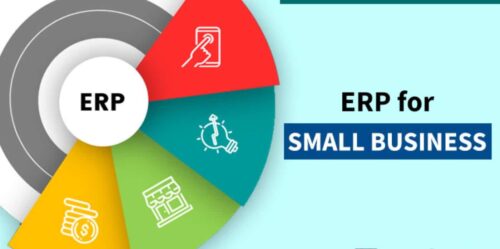In the fast-paced world of business, small enterprises face unique challenges in managing their operations efficiently. Enter Enterprise Resource Planning (ERP) systems, a game-changer for businesses of all sizes, especially small and medium-sized enterprises (SMEs).
I. Introduction
A. Definition of ERP
At its core, ERP integrates various business functions into a single system to streamline processes and information across an organization.
B. Importance of ERP for Small Businesses
While traditionally associated with larger corporations, ERP systems offer substantial benefits to small businesses by providing a centralized platform for managing key operations.
II. Benefits of ERP for Small Businesses
A. Streamlined Processes
ERP ensures that business processes are integrated, reducing manual efforts and minimizing errors.
B. Improved Efficiency
With real-time data accessibility, small businesses can make quicker and more informed decisions, enhancing overall efficiency.
C. Enhanced Data Security
ERP systems often come with robust security features, protecting sensitive business data from potential threats.
D. Better Decision-Making
Access to accurate and timely information empowers small business owners to make strategic decisions that positively impact their bottom line.
III. Key Features of ERP for Small Businesses
A. Customization
Adaptability is key. ERP systems for small businesses should allow for customization to meet specific needs without overwhelming users.
B. Scalability
As small businesses grow, their ERP system should seamlessly scale to accommodate increased data and operational complexities.
C. User-Friendly Interface
An intuitive interface ensures that employees can quickly learn and adapt to the ERP system, maximizing its benefits.
D. Integration Capabilities
Effective ERP systems integrate with other tools, fostering a cohesive digital ecosystem within the organization.
IV. Common Challenges and Solutions
A. Implementation Challenges
Thorough planning and collaboration with an experienced ERP provider can mitigate implementation challenges.
B. Training Issues
Investing in comprehensive training programs ensures employees are proficient in using the ERP system.
C. Cost Concerns
While cost is a legitimate concern, the long-term benefits of ERP often outweigh the initial investment.
D. Choosing the Right ERP System
Thoroughly researching and understanding the unique needs of your business is crucial in selecting the right ERP system.
V. Case Studies
A. Success Stories of Small Businesses
Several small businesses have witnessed remarkable growth and efficiency improvements after implementing ERP systems.
B. Lessons Learned
Analyzing the experiences of other small businesses provides valuable insights into successful ERP adoption.
VI. Future Trends in ERP for Small Businesses
A. Cloud-Based Solutions
The future lies in cloud-based ERP solutions, offering flexibility and accessibility from anywhere.
B. AI and Automation Integration
Emerging technologies like artificial intelligence and automation will play a pivotal role in enhancing ERP capabilities.
C. Mobile ERP
The rise of mobile ERP solutions will empower businesses to manage operations on the go.
VII. How to Implement ERP Successfully
A. Planning Phase
Thorough planning is the foundation of successful ERP implementation. Identify goals, timelines, and key stakeholders.
B. Choosing the Right Vendor
Selecting a reputable ERP vendor is crucial. Consider their track record, customer reviews, and the scalability of their solutions.
C. Training and Adoption Strategies
Invest in training programs to ensure smooth adoption. Involving employees in the process fosters a sense of ownership.
D. Continuous Improvement
ERP implementation is an ongoing process. Regularly assess and optimize the system to meet evolving business needs.
VIII. Selecting the Right ERP System
A. Assessing Business Needs
Understand the unique requirements of your business to choose an ERP system that aligns with your goals.
B. Budget Considerations
Balance the initial cost with long-term benefits. Choose a system that offers value for your investment.
C. Vendor Reputation
Research the reputation of ERP vendors. Client testimonials and reviews provide valuable insights.
D. User Reviews
Feedback from actual users is invaluable. Consider user reviews when evaluating ERP systems.
IX. Overcoming Resistance to Change
A. Communicating the Benefits
Clearly communicate how ERP benefits employees and the organization as a whole.
B. Involving Key Stakeholders
Involve key personnel in the decision-making process. Their buy-in is crucial for successful implementation.
C. Addressing Concerns Proactively
Anticipate and address concerns before they become roadblocks. Open communication is essential.
D. Celebrating Achievements
Acknowledge and celebrate milestones during the ERP implementation to boost morale and motivation.
X. The Future Landscape of ERP in Small Businesses
A. Emerging Technologies
Stay abreast of emerging technologies to ensure your ERP system remains cutting-edge.
B. Global Market Trends
Consider global market trends to adapt your ERP system to the changing business landscape.
C. Industry-Specific Solutions
Explore industry-specific ERP solutions tailored to the unique needs of your sector.
D. The Role of ERP in Digital Transformation
ERP systems will continue to play a central role in the digital transformation journey of small businesses.
XII. FAQs
A. What is ERP, and why is it important for small businesses?
ERP, or Enterprise Resource Planning, is a system that integrates various business functions into a single platform, crucial for small businesses to streamline operations.
B. How can small businesses overcome challenges in implementing ERP?
Thorough planning, employee training, and selecting the right ERP system are key to overcoming implementation challenges.
C. Are there affordable ERP solutions for startups?
Yes, several ERP vendors offer scalable solutions suitable for startups with budget considerations.
D. What are the long-term benefits of adopting ERP for small businesses?
Long-term benefits include improved efficiency, better decision-making, and scalability as the business grows.
E. How often should a small business update its ERP system?
Regular updates are essential to ensure the ERP system remains aligned with evolving business needs and technological advancements.
Conclusion
A. Recap of Key Points
ERP is a transformative tool for small businesses, streamlining processes, improving efficiency, and fostering better decision-making.
B. Encouragement for Small Businesses to Embrace ERP
The journey may be challenging, but the benefits of ERP adoption are worth the effort for the long-term success of small businesses.
